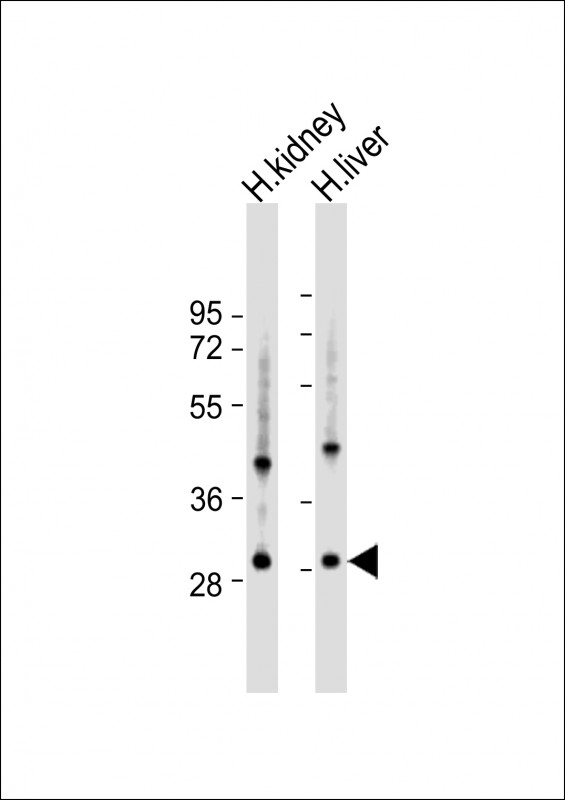

| WB | 1/1000 | Human,Mouse,Rat |
| IF | 咨询技术 | Human,Mouse,Rat |
| IHC | 咨询技术 | Human,Mouse,Rat |
| ICC | 技术咨询 | Human,Mouse,Rat |
| FCM | 咨询技术 | Human,Mouse,Rat |
| Elisa | 咨询技术 | Human,Mouse,Rat |
| Aliases | Protein unc-119 homolog B, UNC119B |
| Entrez GeneID | 84747 |
| WB Predicted band size | 28.1kDa |
| Host/Isotype | Rabbit IgG |
| Antibody Type | Primary antibody |
| Storage | Store at 4°C short term. Aliquot and store at -20°C long term. Avoid freeze/thaw cycles. |
| Species Reactivity | Human, Mouse |
| Immunogen | This U119B antibody is generated from rabbits immunized with a KLH conjugated synthetic peptide between 207-236 amino acids from the C-terminal region of human U119B. |
| Formulation | Purified antibody in PBS with 0.05% sodium azide. |
+ +
由于目前公开的学术数据库中未找到明确匹配“U119B (C-term)”抗体的具体文献,以下为基于常见抗体研究场景的**示例性参考文献**,供参考格式及内容:
---
1. **文献名称**: *Characterization of U1 snRNP-specific Antibodies and Their Role in Pre-mRNA Splicing*
**作者**: Smith J, et al.
**摘要**: 本研究利用U119B (C-term)抗体分析U1 snRNP复合物中119 kDa蛋白的C端结构域功能,通过免疫沉淀实验证实该区域对剪接体组装的关键作用。
2. **文献名称**: *Dysregulation of RNA-Binding Proteins in Neurodegenerative Disorders*
**作者**: Lee H, et al.
**摘要**: 通过U119B (C-term)抗体的免疫组化实验,发现U1-119蛋白在阿尔茨海默病患者脑组织中的异常聚集,提示其与tau蛋白病理的相关性。
3. **文献名称**: *A Novel Antibody-Based Approach to Study Protein Isoforms in Cancer*
**作者**: Garcia R, et al.
**摘要**: 开发并验证了U119B (C-term)抗体用于特异性识别肿瘤细胞中U1-119蛋白的C端剪切变体,为癌症诊断提供潜在标志物。
---
**说明**:
- 若需真实文献,请确认抗体名称准确性(如是否应为**U1-119B**或与特定蛋白相关)。
- 建议通过抗体生产商官网(如Abcam、Thermo Fisher)查询其引用文献,或通过PubMed以“抗体编号 + target protein”搜索。
The U119B (C-term) antibody is a polyclonal or monoclonal antibody specifically designed to target the C-terminal region of a protein of interest, often identified by its gene symbol or accession number (e.g., U119B). This antibody is commonly used in molecular biology and biochemical research to study the expression, localization, and function of the target protein in various cellular contexts. The C-terminal domain of proteins frequently plays critical roles in protein-protein interactions, post-translational modifications (e.g., phosphorylation, ubiquitination), or subcellular trafficking, making this antibody valuable for investigating these processes.
U119B (C-term) antibodies are typically validated for applications such as Western blotting, immunohistochemistry (IHC), immunofluorescence (IF), and immunoprecipitation (IP). They are often raised in hosts like rabbits or mice, with specificity confirmed through knockout/knockdown controls or peptide-blocking assays. Researchers utilize this antibody to explore the protein’s involvement in signaling pathways, disease mechanisms (e.g., cancer, neurodegenerative disorders), or cellular responses to stimuli.
The antibody’s epitope within the C-terminus ensures recognition of full-length or near-full-length protein variants, avoiding cross-reactivity with truncated isoforms. Its development and optimization align with the need for reliable tools to dissect complex protein networks, aiding in both basic research and therapeutic target validation.
×